
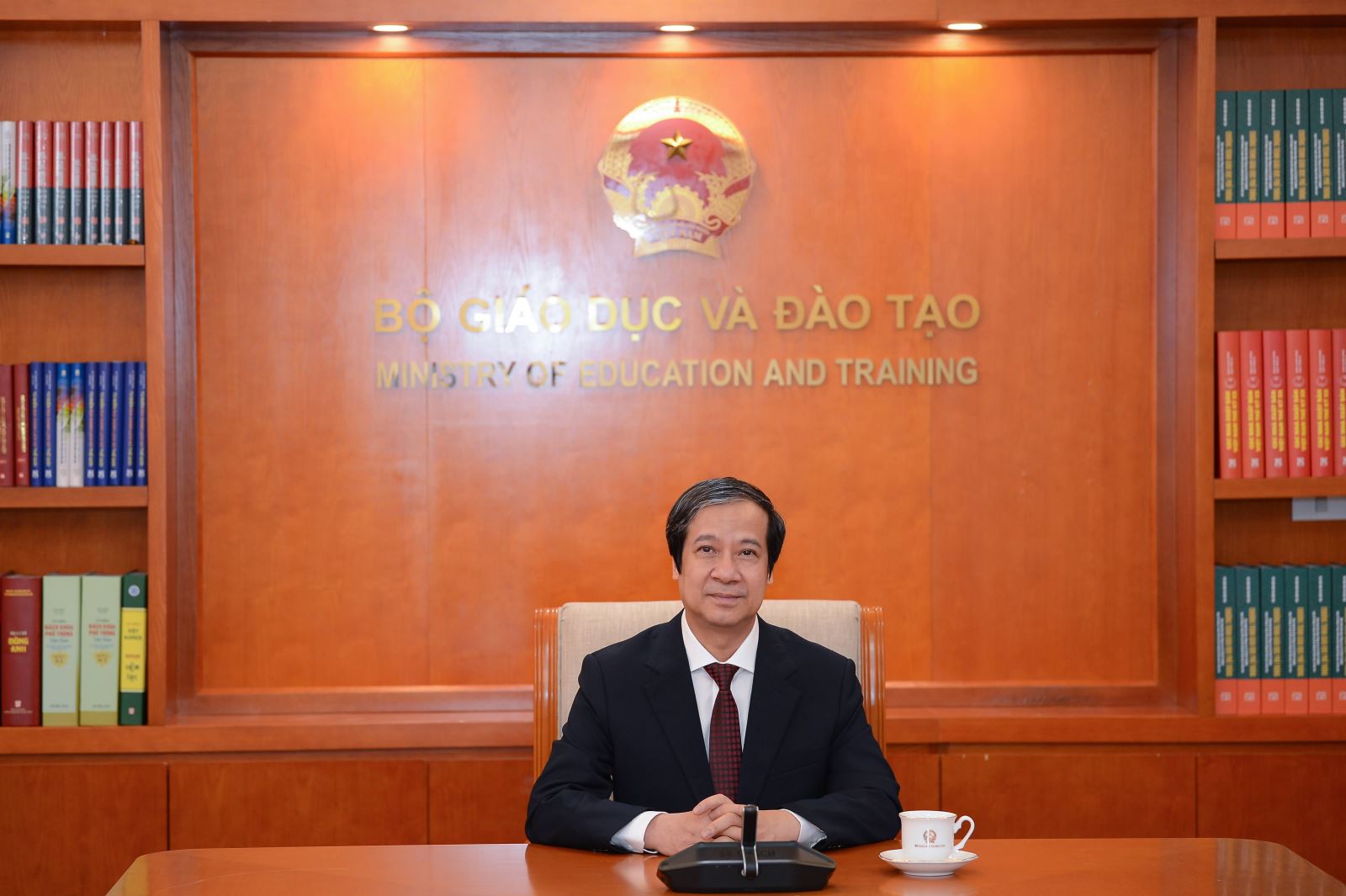
Minister Nguyen Kim Son answers the press on the occasion of the new school year
On the occasion of the 80th anniversary of the establishment of the Ministry of National Education (now the Ministry of Education and Training ), could you please tell us what contributions the Education and Training sector has made to the development of the country?
Immediately after the success of the August Revolution, the Ministry of National Education was established, with the mission of building a completely new education system, of the people, by the people and for the people. Under the leadership of the Party and President Ho Chi Minh, the new education system was established with three core principles: “nationalization, scientificization, popularization”.
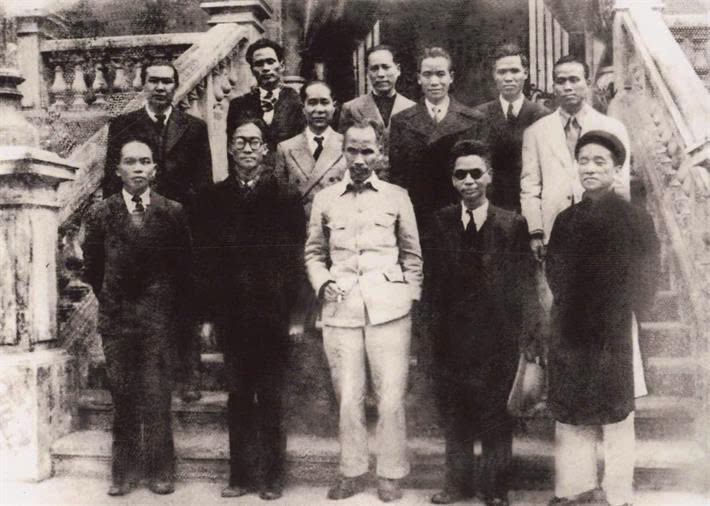
President Ho Chi Minh and members of the Provisional Government of the Democratic Republic of Vietnam. Minister of National Education Vu Dinh Hoe stands in the front row, second from left.
During the period 1945-1954, the Popular Education and Cultural Supplementary Education movements eliminated illiteracy for millions of people, raising the people's knowledge. Despite the war, the school system was continuously expanded to train a generation of "Resistance Citizens", the core human resource for the cause of "resistance and nation building".
During the period 1954-1975, although the country was divided and engulfed in the flames of war, education still achieved remarkable results. The 1956 education reform built a complete national education system. The North basically eliminated illiteracy. Tens of thousands of cadres, intellectuals, engineers, doctors, and teachers were trained domestically and sent to socialist countries for training; Southern students were raised and trained in the North and became the core human resources serving the cause of unification and national construction in the future.
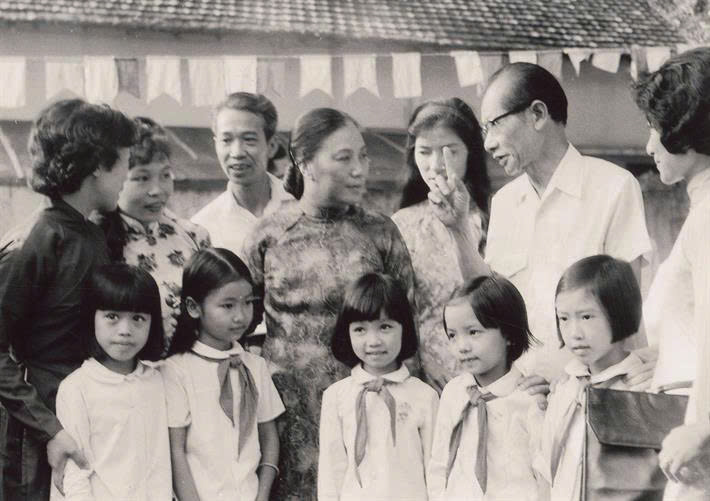
Minister of Education Nguyen Thi Binh talks with teachers and students of Le Ngoc Han School, Hanoi (September 15, 1976)
During the period 1975-1986, the country faced many difficulties due to the consequences of war, siege, embargo and the consequences of centralized bureaucratic management and subsidies, but education still achieved many important achievements. The most prominent of these was the successful unification of the national education system; the network of schools was maintained and expanded to all regions; success in eliminating illiteracy and improving people's knowledge; and at the same time, building a comprehensive system of educational guidelines and policies - the guiding principle for the sector's activities in the following years.
From 1986 to present, the country has entered the process of innovation and integration, education has been identified as "education is the top national policy". Resolution No. 29-NQ/TW dated November 4, 2013 was issued, becoming a particularly important foundation for fundamental and comprehensive innovation in education and training. Along with that, the legal system and policies have been constantly improved, creating a solid legal basis for educational innovation. The two innovations of the general education program (2006 and 2018), especially the 2018 General Education Program, marked a major turning point in the viewpoint, goals, content, and educational methods when shifting from teaching and learning with a heavy emphasis on imparting knowledge to developing learners' capacity and qualities. All of these have created a completely new look for education, both in scale and quality.
What is the special significance of the opening ceremony of the new school year 2025-2026, Minister?
The opening ceremony of the 2025-2026 school year takes place in a special context: the whole country celebrates the 80th anniversary of National Day; carries out the historical "rearrangement of the country"; organizes Party Congresses at all levels... For the education sector, the beginning of the new school year is also an occasion to celebrate the 80th anniversary of the education sector's tradition, as well as the 80th anniversary of the establishment of the Ministry of National Education. This is not only an opportunity for us to look back on the 80-year journey of education to develop the country, but also an opportunity to be more aware of the mission and responsibility of education in creating people, building and developing the country, striving to integrate into the new era.
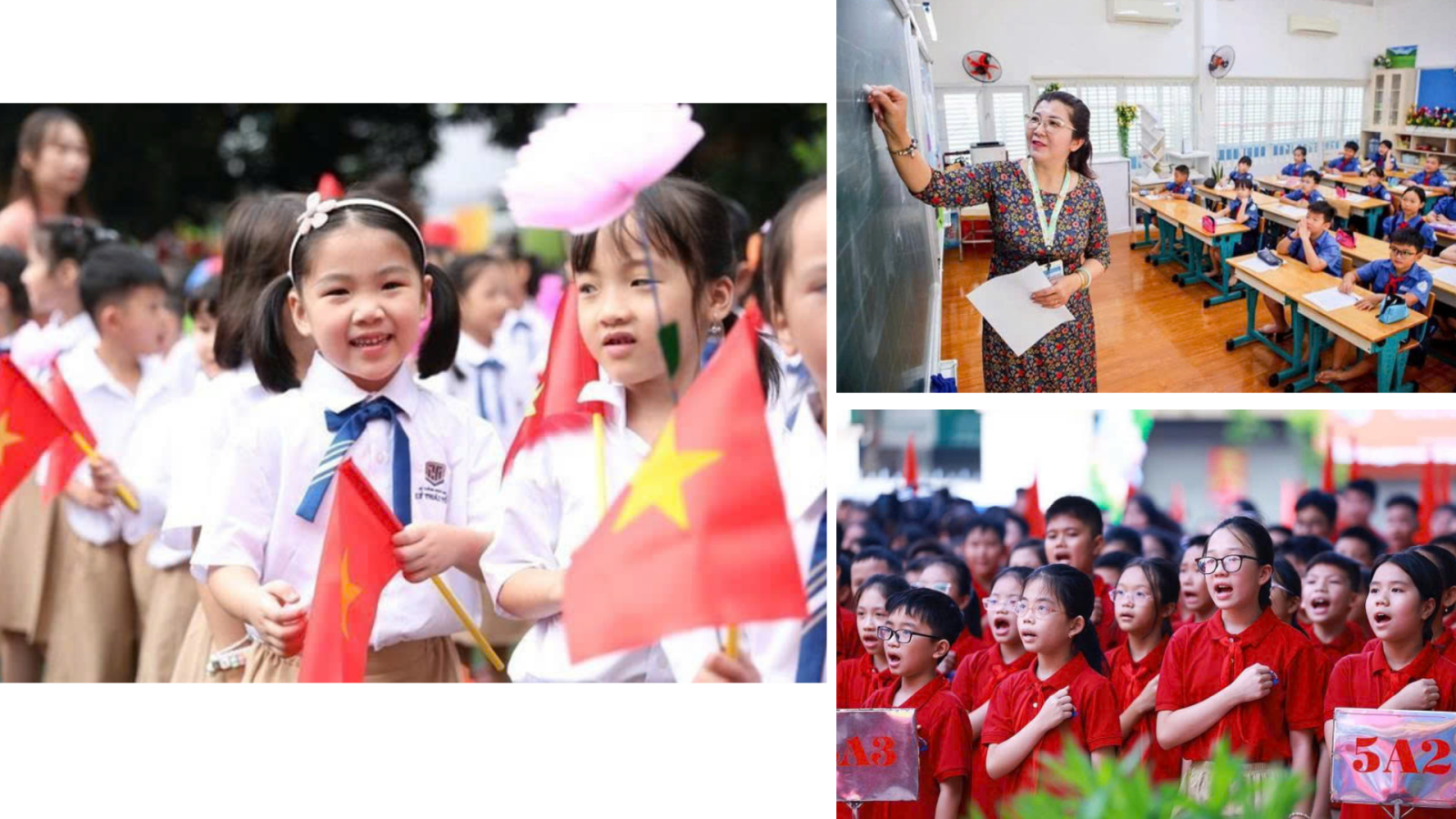
The meaning of the opening ceremony became even more profound when 52,000 educational institutions across the country connected online and broadcast live, with the presence of the highest leaders of the Party and State, to spread the belief, spirit, and determination to bring Vietnamese education to new heights.
What are the opportunities and challenges this school year, Minister?
This school year, the education sector is facing unprecedented opportunities. Never before have the Party and State paid as much attention and expectation to education and training as they do today. The most important of these is the Politburo's recent issuance of Resolution 71-NQ/TW on breakthroughs in education and training development. This is an important political foundation to further promote the fundamental and comprehensive innovation of education and training that was established in Resolution 29-NQ/TW (2013) and continued to be emphasized in Conclusion 91-KL/TW (2024).
Along with that, a national target program on education and training development is being built; four important laws on education (Law on Teachers, Law on Education, Law on Higher Education and Law on Vocational Education) have been and are expected to be issued this year, creating a solid foundation for operating a modern, synchronous and effective education system. Digital transformation, application of artificial intelligence and STEM education are also opening up opportunities for education to enter a stage of quality improvement and comprehensive innovation.
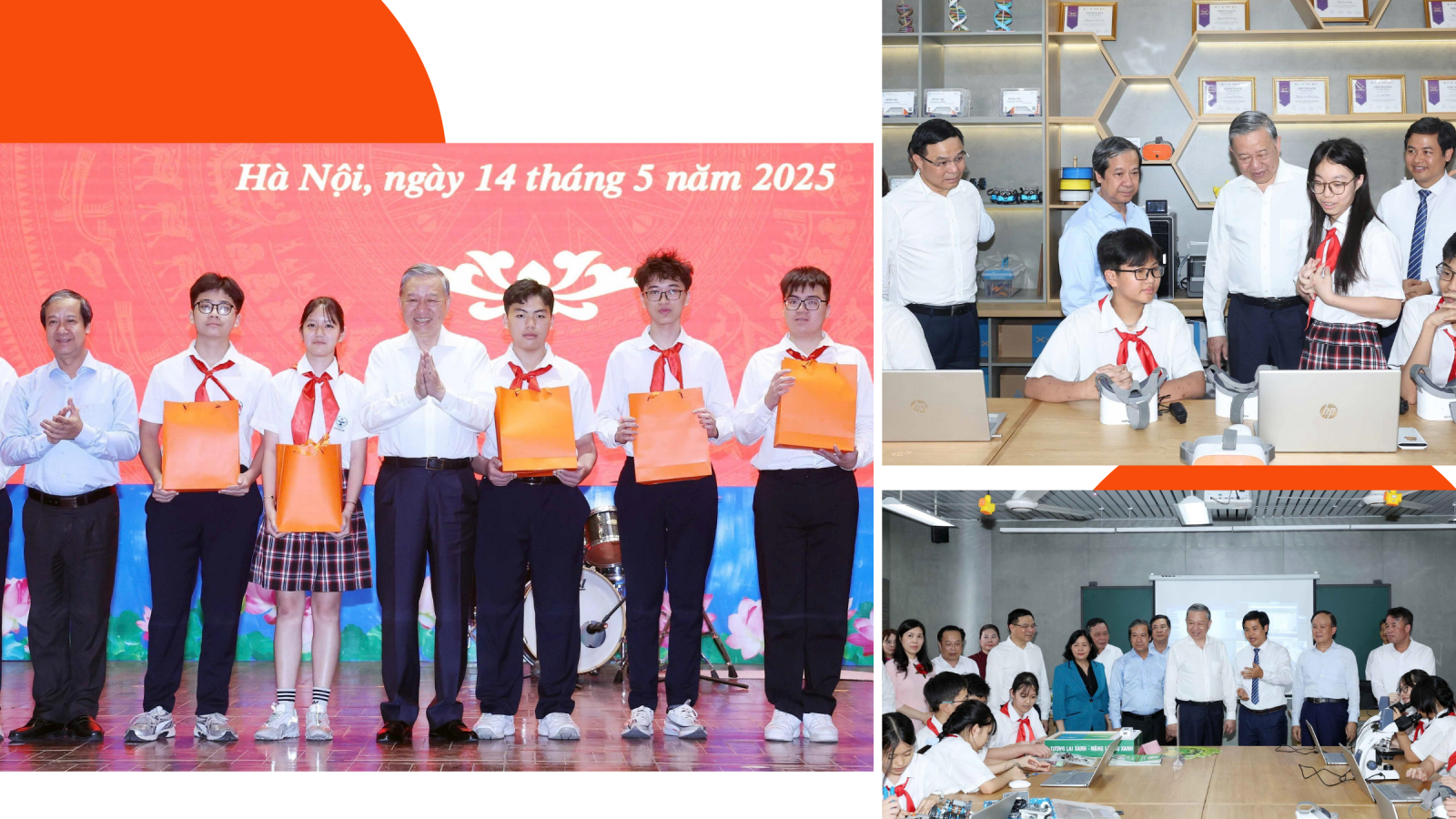
On the afternoon of May 14, 2025, in Hanoi, General Secretary To Lam visited and encouraged cadres, teachers, and students and presented STEM education practice rooms to two schools, Hanoi - Amsterdam High School for the Gifted and Cau Giay Secondary School. Photo: Thong Nhat - VNA
Besides opportunities, the education sector also faces many challenges. The operation of a two-tier local government model, especially at the commune level, places high demands on managing changes in organization, personnel and apparatus. The issues of educational equity; extra teaching and learning; teacher recruitment and rotation; and universalization are also challenges that the sector must resolutely address. In addition, absorbing huge investment resources in the coming time, ensuring efficiency and compliance with regulations also requires great efforts and hard work.
In the 2024-2025 school year, the entire sector has strived to overcome many difficulties and challenges and achieved many good results. On behalf of the leaders of the Ministry of Education and Training, I would like to acknowledge, commend and thank the outstanding efforts of the team of managers, teachers, staff and students.
The 2025-2026 school year is a very important school year, with many important tasks to be done and many opportunities for innovation. The keyword of this school year is "implementation". That is to focus on implementing well the Party's policies and guidelines, the State's laws on education as well as the 10 key tasks and solutions for the 2025-2026 school year of the education sector. That is the way for the whole sector to inherit and promote the achievements of the past 80 years, overcome existing shortcomings and limitations, and open up new paths for Vietnamese education in the coming time.
Education is a career of a hundred years, requiring vision, perseverance, a spirit of fairness and the highest responsibility. I call on the entire industry, from managers to teachers, staff, and all students to prepare the best mindset, spirit and conditions, to unite and join forces, so that the new school year becomes a busy but joyful and successful year.
On the eve of the new school year, Resolution 71-NQ/TW of the Politburo on breakthroughs in education and training development was issued, considered a pillar Resolution. Could you please tell us what the responsibilities of the education sector are specifically in this school year?
Resolution 71 was issued on the occasion of the 80th anniversary of National Day, the 80th anniversary of the tradition of the Education sector and also the 80th anniversary of the establishment of the Ministry of National Education (now the Ministry of Education and Training) continuing to demonstrate the Party's special attention to education and training; affirming that education is always an element closely linked to and deciding the development of the country; showing the consistency of the viewpoint that education and training is the top national policy, deciding the future of the nation.
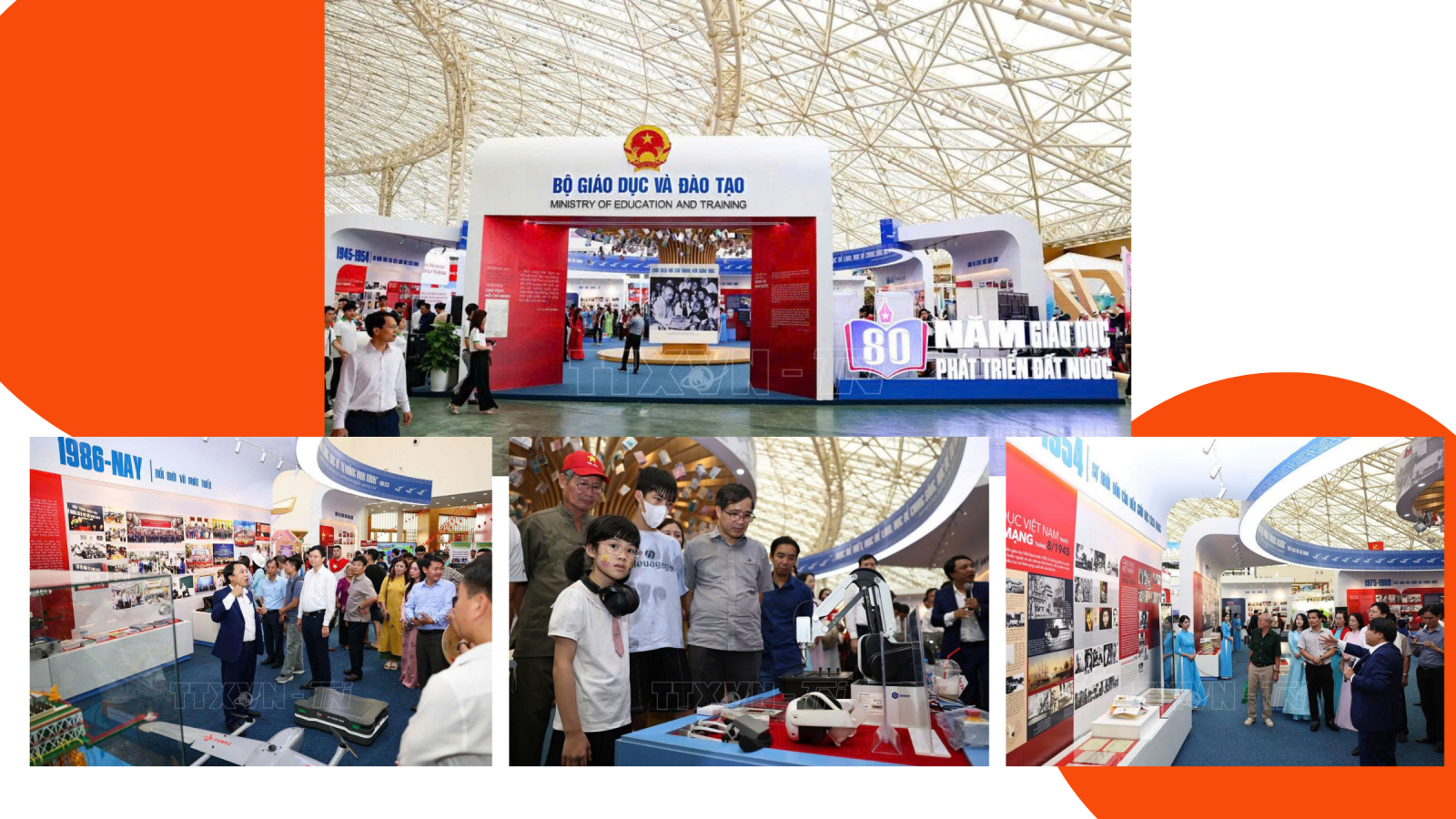
Reenacting the 80-year journey of education developing with the nation.
The Resolution also demonstrates the Party's new vision and strategy for the future education system, when the world context is undergoing profound and comprehensive changes, especially digital technology and artificial intelligence are reshaping education on a global scale. In addition, the Resolution has identified major goals along with a series of tasks and solutions of a strong breakthrough nature to innovate and improve Vietnamese education.
For the entire education sector, this is a great opportunity to make a breakthrough, to affirm the decisive position of education in the country's development. Aware of this, the Ministry of Education and Training is urgently developing and submitting to the Government a draft of the Government's Action Program to implement Resolution 71 and will concretize it with the Ministry of Education and Training's Action Plan to implement it right from the beginning of this school year.
Dear Minister, how will education management in the two-tier local government model be implemented to ensure no disruption?
To ensure that educational activities are not disrupted in the context of two-level local government, the Ministry of Education and Training has implemented many synchronous solutions.
Regarding institutional improvement, the Ministry has developed and issued 2 Decrees and 6 Circulars regulating decentralization, delegation of authority, and assignment of state management authority in the field of education.
Regarding professional guidance, the Ministry has issued official dispatches on primary school admissions regardless of administrative boundaries; organizing two sessions of teaching per day; implementing tasks for the 2026-2027 school year; implementing programs and textbooks in the context of changes in administrative boundaries... The Ministry also organized seminars, established hotlines, received information and resolved difficulties and problems of localities.
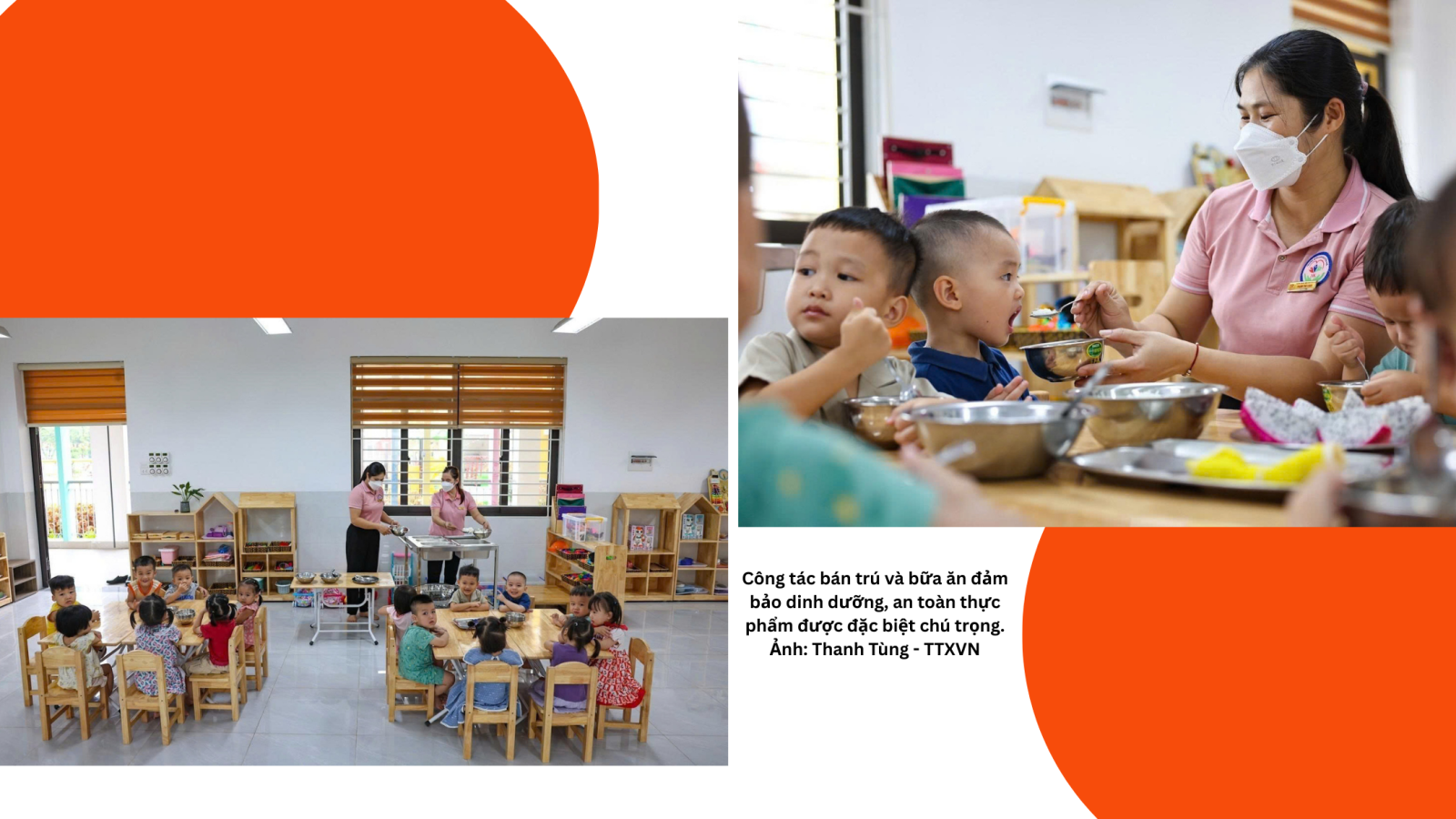
Regarding capacity building, the Ministry has developed documents, organized training courses, and published handbooks to support education managers at the commune level and the Department of Education and Training in accessing complete, systematic, concise, and easy-to-understand information. In addition, the Ministry has also organized 6 inspection teams in 15 provinces on this issue.
In the coming time, the Ministry of Education and Training will continue to review legal documents; strengthen professional guidance; complete the industry data system, ensure connectivity and synchronization... and continue to accompany and support localities in implementing decentralized and delegated tasks.
To effectively implement educational tasks in the 2025-2026 school year in the new context, the Ministry also noted a number of contents to localities.
First of all, the provincial People's Committee should promptly advise competent authorities to perfect legal institutions and build an effective coordination mechanism between the provincial and communal levels; issue clear regulations on the functions, tasks, and organizational structure of the Department of Education and Training and the Department of Culture and Social Affairs at the communal level, and at the same time assign staffing quotas and the number of labor contracts to educational institutions.
People's Committees at all levels need to effectively implement solutions to inspect and remove difficulties at the commune level; have solutions to mobilize and second specialized staff from the Department of Education and Training or educational institutions to support the commune level, especially in places where commune-level staff do not have expertise. In addition, it is necessary to strongly apply information technology and digital transformation to ensure smooth and timely communication between levels.
The Department of Education and Training needs to coordinate with relevant departments, agencies and sectors to develop documents, organize training and in-depth training, and improve the professional capacity of commune-level officials and civil servants in charge of education. At the same time, guide the establishment of inter-school and inter-commune professional clusters to organize professional activities and professional training for teachers, replacing the previous direct role of the Department of Education and Training.
Could the Minister briefly evaluate the 2018 General Education Program?
The first batch of students graduating from the 2018 General Education Program showed many positive points. Accordingly, students experienced a variety of activities, revealed their strengths, chose subjects with career orientation, and accessed comprehensive knowledge thanks to integrated subjects. However, the implementation of the 2018 General Education Program in the past also revealed some shortcomings. Specifically, at the high school level, the choice of subjects was limited by teachers and classrooms; at the middle school level, teaching integrated subjects encountered difficulties due to uneven teacher capacity and learning materials.
To overcome this, the Ministry issued Official Dispatch No. 4555/BGDĐT-GDPT dated August 5, 2025, requiring high schools to publicize plans for organizing teaching of elective subjects, coordinate with other schools to expand opportunities for students; support students when they need to adjust their subject choices. For secondary schools, continue to train teachers in integrated teaching, compile illustrative learning materials, and implement a model of teacher clusters supporting each other, in order to improve quality and create excitement for learning.

In the 2025-2026 school year, the Ministry of Education and Training will conduct a comprehensive assessment of the 2018 General Education Program after an implementation cycle to clarify the level of achievement in developing students' qualities and abilities; point out advantages, limitations, causes and propose solutions for adjustment, ensuring the Program is practical, effective and sustainable.
The assessment focuses on: facilities, teaching equipment, teaching staff and managers, training quality, suitability of textbooks, effectiveness of innovative methods, testing and assessment; at the same time, considering selective teaching in high schools and career guidance activities from middle schools to ensure students' real right to choose. The Ministry of Education and Training also coordinates with ministries, branches, localities, domestic and foreign experts to conduct comprehensive surveys, research and assessments.
The consistent orientation is to adhere to the goal that has been determined by the Party and the National Assembly, which is to comprehensively develop students' qualities and abilities, in conjunction with the requirements of human resource training for the new period. The spirit is to look straight at the truth, evaluate objectively, and make timely adjustments, all for the sake of students.
Regarding the management of extra teaching and learning, the Ministry of Education and Training continues to adhere to the viewpoint that "extra teaching can consolidate knowledge, but brings little value to human development". The profound consequences of the widespread situation of extra teaching and learning require continued drastic rectification. Therefore, in the 2025-2026 school year, the Ministry of Education and Training will continue to direct and urge localities to issue regulations on the management of extra teaching and learning to enhance the responsibility of the government, while requiring educational institutions to effectively implement the General Education Program.
Implementing Directive No. 17/CT-TTg dated June 6, 2025 of the Prime Minister on teaching 2 sessions/day, the Ministry has directed schools to develop an education plan that clearly shows the plan to mobilize and use resources for implementation in qualified places. The plan must specify the content, duration, and target students, and at the same time assign teachers reasonably and in accordance with regulations; focus on differentiating subjects, nurturing excellent students, reviewing for final year students and supporting students who have not met the requirements according to Circular 29.
At the same time, the Ministry emphasized the need to innovate management work, strengthen inspection and supervision of the implementation of the General Education Program as well as management of extra teaching and learning, ensuring strict implementation of policies and laws.
The organization of the second session, including additional teaching for 3 subjects as prescribed, is carried out in accordance with Directive 17. The funding for the second session is mainly guaranteed from the state budget according to the Prime Minister's direction. Socialized sources are implemented according to current regulations. In the coming time, the Ministry of Education and Training will coordinate with the Ministry of Finance and localities to develop specific mechanisms and policies on mobilizing funds for the implementation of teaching 2 sessions/day.
About the pilot high school graduation exam on computer how is it carried out? Pilot high school graduation exam on computer
In preparation for the pilot implementation of computer-based high school graduation exams from 2027 under the direction of the Prime Minister, the Ministry of Education and Training is focusing on implementing a number of key tasks, such as: developing a project to organize computer-based high school graduation exams, submitting it to the Prime Minister for approval in 2026; mobilizing experts to build a standardized question bank (expected to be applied from 2027); and developing procedures and regulations for organizing computer-based exams, organizing training courses and seminars nationwide; continuing to coordinate with the Government Cipher Committee in transferring and receiving exam questions and other security aspects related to the exam.
Currently, the Ministry of Education and Training is preparing software systems to organize computer-based exams and testing computer-based exams in localities. It is expected that this school year, the test will be implemented for more than 100,000 students.
The organization of the High School Graduation Exam for graduation recognition currently has very specific goals, including: first, assessing the level of learners according to the requirements for developing qualities and capacities of the General Education Program, using the exam results to consider recognition of high school graduation; second, the results of the Exam are used as one of the bases for assessing the teaching quality of general education institutions, the direction of educational management agencies; third, providing reliable data for higher education and vocational education institutions to use in enrollment.
At present, this is the only national exam for all students to assess the general output of high school, with a common assessment scale nationwide. Therefore, it is necessary to maintain the organization to assess the level of GDPT standards, providing national data for research, construction, and adjustment of general education policies. At the same time, it is possible to assess the quality of education in regions across the country. The exam results are the output of high school, a source of reference information for universities and vocational training institutions to organize enrollment.
How will recruitment, policies and regimes for teachers be implemented this school year, Minister?
Immediately after the National Assembly passed the Law on Teachers, the Ministry of Education and Training proactively developed a system of documents guiding its implementation. In particular, regarding the recruitment of teachers, the Ministry is developing a Circular with the direction of assigning the Department of Education and Training to preside over the implementation, or advising the Provincial People's Committee to decentralize and authorize in accordance with local practices. The above approach ensures the implementation of the policy of reducing intermediaries, synchronizing the quality of recruitment (one-time recruitment can be registered for admission to many schools based on exam/review results), saving costs, increasing opportunities for participants in recruitment; at the same time, contributing to overcoming the situation of local surplus/shortage of teachers as well as ensuring the structure of the team according to grade level, subject, and educational activities.
In addition, the Ministry of Education and Training is developing a Decree detailing a number of articles of the Law on Teachers, including regulations on the content and form of teacher recruitment. As expected, the recruitment will include 02 rounds of exams, compatible with current regulations on civil servant recruitment. However, round 2 - on expertise and profession - will be designed differently, closely following the actual process of teaching and education activities, ensuring correct assessment of pedagogical capacity and professional skills of candidates at each level of education and training. This is expected to be an important innovation, aiming to overcome previous limitations when applying the general mechanism for civil servants without taking into account the specific characteristics of the teaching profession.
Currently, the Ministry of Education and Training is also finalizing a draft of detailed regulations on salaries, allowances and policies to attract and support teachers. Accordingly, it is expected that the basic salary of all teachers will increase, by at least about 2 million VND, and at most up to 5-7 million VND/person/month. This increase is only calculated on the basic salary, not including other allowances.
In the 2022-2026 period, the education sector will be supplemented with 65,980 positions by the Politburo. In the 2022-2023 and 2023-2024 school years, the country will recruit more than 40,000 teachers. However, due to the continuous increase in the number of students and classes, the demand for teachers has also increased sharply (the 2023-2024 school year will need 13,676 more teachers; the 2024-2025 school year will need about 22,000 more teachers). Therefore, many localities still lack teachers.
The main reason is due to limited recruitment sources. In some subjects such as Information Technology, Foreign Languages, and Arts, it is difficult to recruit students for the teaching profession because teachers' income is still low. In addition, the process of allocating and recruiting staff in many localities is slow and prolonged.
Faced with this situation, the Ministry of Education and Training has been implementing many solutions such as: directing training institutions to open major codes, train teachers according to the actual needs of localities, especially specific subjects; requiring localities to recruit enough assigned staff; directing localities to review and arrange the school network; piloting the autonomy mechanism in some public preschools and general schools; promoting socialization...
Along with the solutions from the Central Government, the Ministry recommends that localities proactively recruit enough staff, have policies to attract and support teachers, and arrange funding to implement teacher contracts according to regulations. After the Politburo issued Conclusion Notice No. 81-TB/TW dated July 18, 2020-25 on the policy of investing in building schools for border communes, the Ministry of Education and Training coordinated with localities to carry out the work to achieve the set goals.
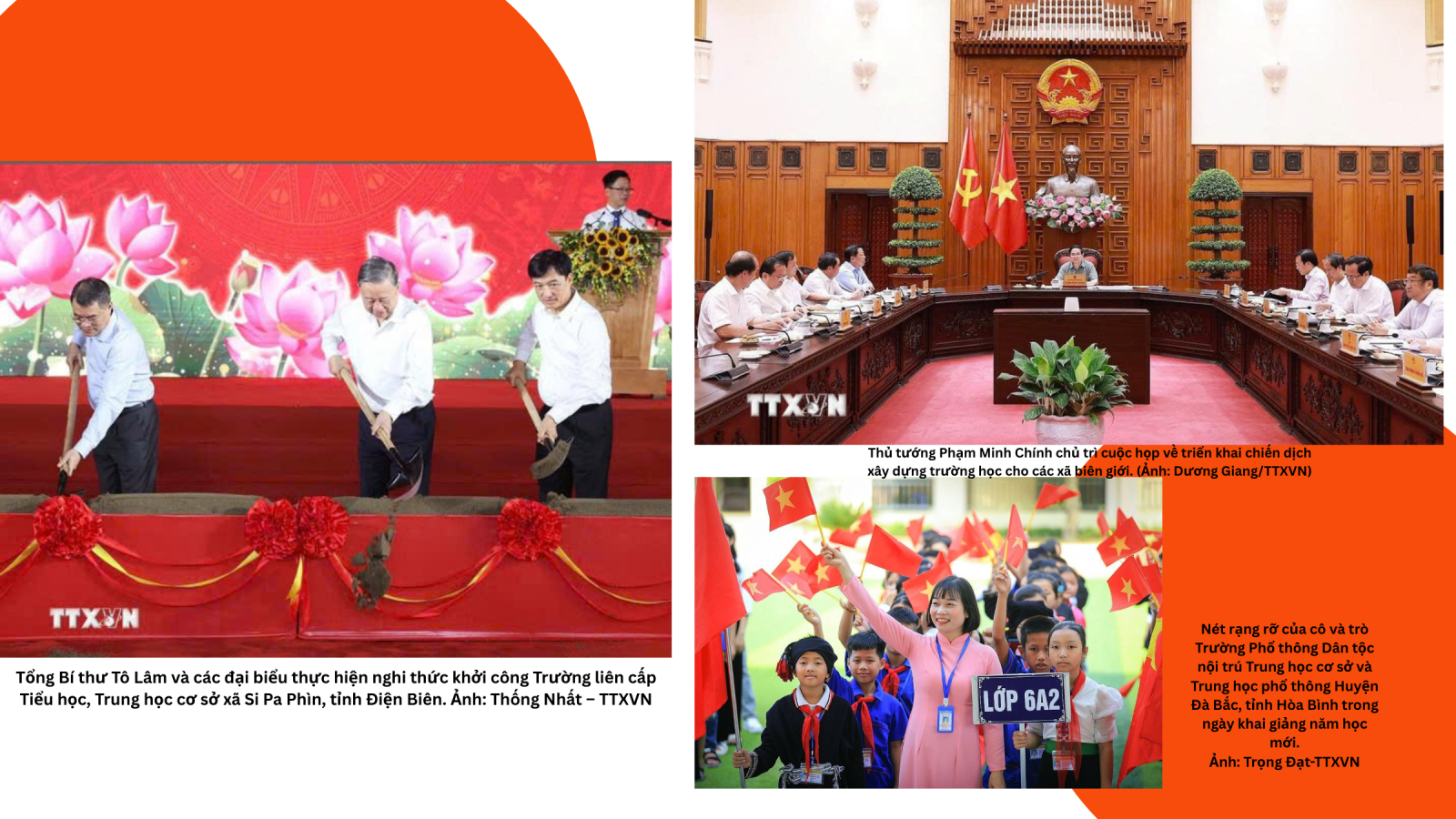
Implementing the Conclusion of the General Secretary, the Politburo and the direction of the Prime Minister on building schools for border communes, the Ministry of Education and Training has been urgently implementing a series of important tasks.
Accordingly, the Ministry has requested localities to prepare land, select construction locations; determine technical standards and scale according to level 2 - the highest level of general school facilities.
In addition, the Ministry also coordinated with relevant ministries and branches to review and select 100 typical schools, implementing immediately in 2025, striving to complete before June 30, 2026. These schools are planned synchronously and modernly, with an average area of 5-10 hectares, a scale of about 30 classes, equivalent to about 1,000 students per school; ensuring full connection to electricity, water, traffic, telecommunications, drainage systems, ensuring absolute safety. The facilities of the schools will be designed synchronously with full functional areas.
In difficult and special areas, the construction area can be less than 5 hectares, the student population is less than 1,000, but still must meet the minimum standards. On the contrary, in densely populated areas, the scale can be larger than 30 classes, over 1,000 students.
In the coming time, the Ministry will establish a special inter-sectoral working group headed by the Minister of Education and Training to inspect and remove obstacles in the implementation of this task; coordinate with the Ministry of Construction to issue school design models before September 15, 2025 for localities to apply; coordinate with the Ministry of Finance and relevant agencies to monitor progress, ensure quality, efficiency, and compliance with regulations. The Ministry also plans to coordinate with the Central Committee of the Vietnam Fatherland Front and localities to launch a campaign to build schools for border communes this coming October.
Thank you very much Minister!
Performed by: Le Van
Presented by: Bao Ha
Photo: VNA, MOET
Source: https://baotintuc.vn/long-form/emagazine/bo-truong-bo-giao-duc-va-dao-tao-nganh-giao-duc-dung-truoc-co-hoi-chua-tung-co-20250903213626458.htm







![[Photo] Politburo works with the Standing Committees of Vinh Long and Thai Nguyen Provincial Party Committees](https://vphoto.vietnam.vn/thumb/1200x675/vietnam/resource/IMAGE/2025/9/8/4f046c454726499e830b662497ea1893)
![[Photo] Politburo works with the Standing Committees of Dong Thap and Quang Tri Provincial Party Committees](https://vphoto.vietnam.vn/thumb/1200x675/vietnam/resource/IMAGE/2025/9/8/3e1c690a190746faa2d4651ac6ddd01a)
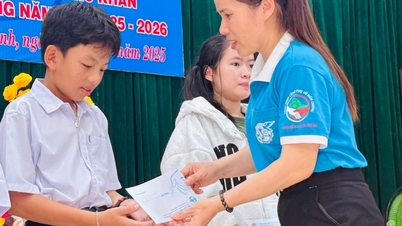







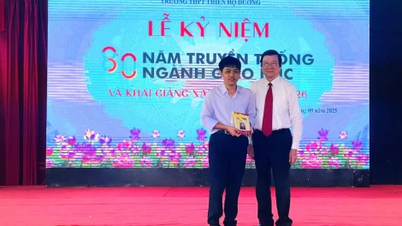

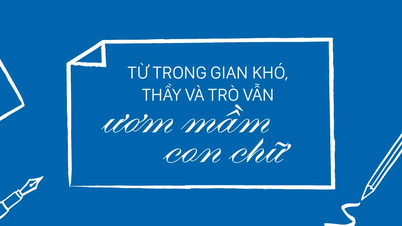

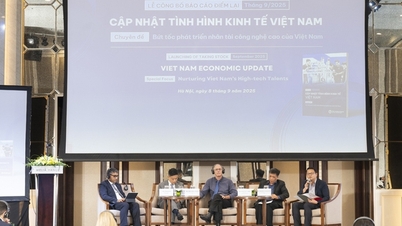














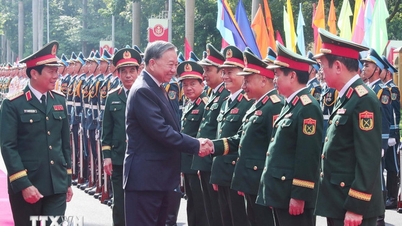


![[Photo] Amazing total lunar eclipse in many places around the world](https://vphoto.vietnam.vn/thumb/1200x675/vietnam/resource/IMAGE/2025/9/8/7f695f794f1849639ff82b64909a6e3d)


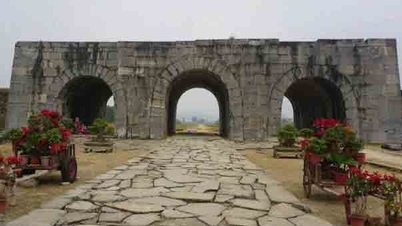
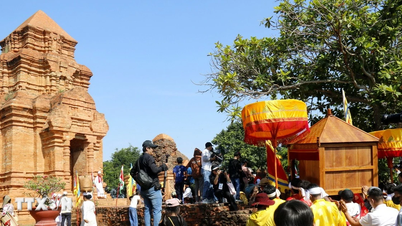




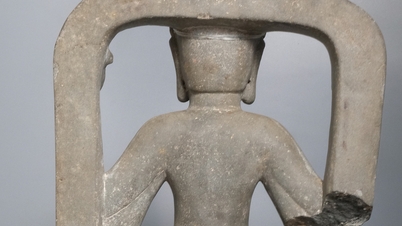
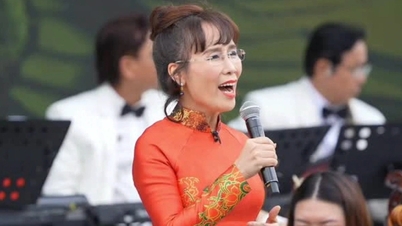

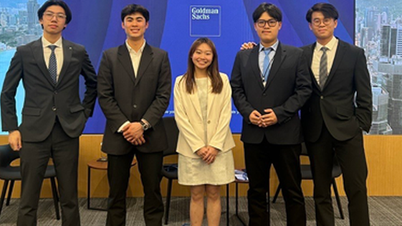





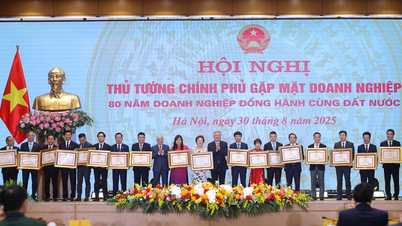







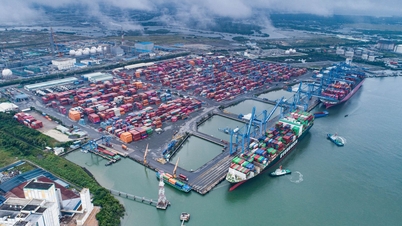



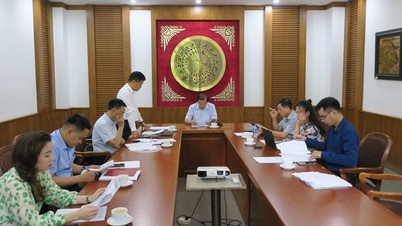



























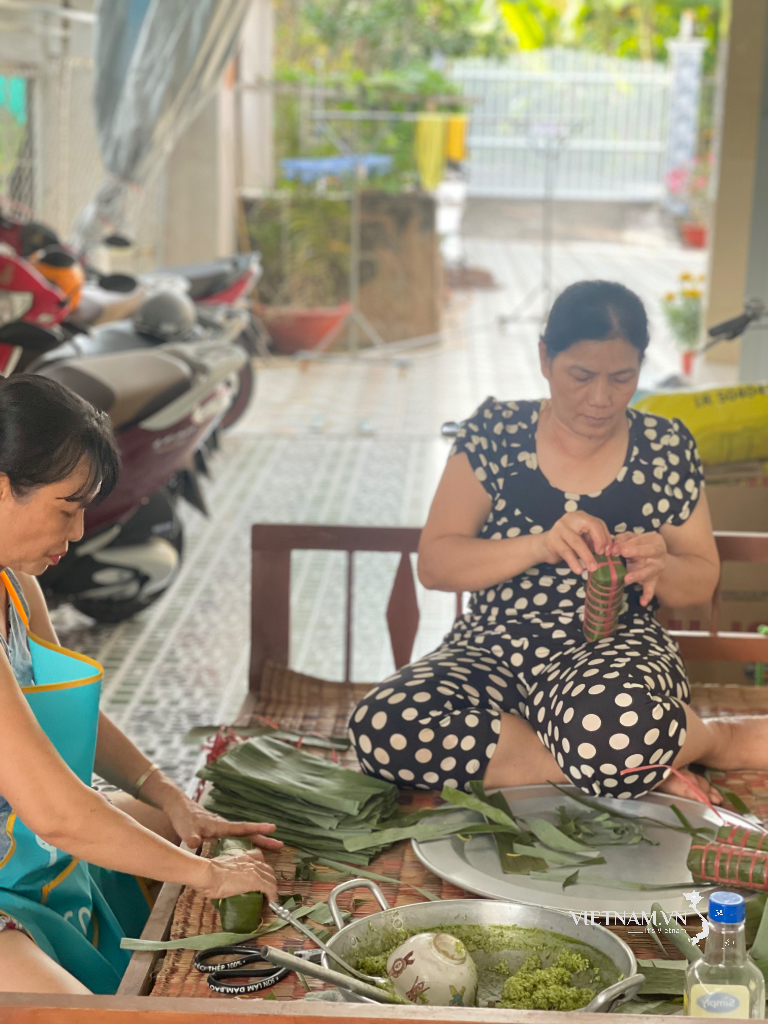
Comment (0)